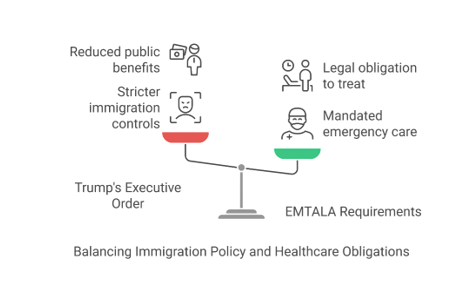
In a move that has sparked significant debate, former President Donald Trump recently signed an executive order aimed at ending federal benefits for individuals living in the United States illegally. The executive order, signed by the White House, explicitly seeks to remove taxpayer-funded benefits from undocumented immigrants, although specific details on which benefits will be targeted remain unclear. While the law currently allows emergency medical care and free public education for children regardless of immigration status, Trump’s order represents his continued effort to reduce public services for those in the country illegally.
The order comes at a time when the Trump administration has criticized the previous Biden administration’s immigration policies. Trump’s executive order specifically calls out the use of parole authority by the Biden administration, which allowed hundreds of thousands of people from countries such as Cuba, Haiti, Nicaragua, and Venezuela to enter the U.S. temporarily. Additionally, the order directs all federal agencies to identify federal spending that contradicts the 1996 welfare reform law, as well as ensuring that state and local governments do not use federal funds to support sanctuary policies that may encourage illegal immigration.
At first glance, this move may seem like an attempt to enforce stricter immigration controls. However, one significant question arises from this order: Could it ultimately hurt hospitals that cannot deny services due to the Emergency Medical Treatment and Labor Act (EMTALA)?
The EMTALA Dilemma
Under EMTALA, hospitals that participate in Medicare must provide emergency medical treatment to anyone who seeks care, regardless of their ability to pay or immigration status. This means that even undocumented immigrants are entitled to emergency medical services, including critical care and labor and delivery services. Hospitals cannot deny these services without the risk of facing serious legal repercussions.
With Trump’s executive order potentially targeting public benefits like Medicaid, there is concern that hospitals could find themselves in a difficult position. On the one hand, EMTALA mandates that they provide care. On the other hand, if federal resources meant to support medical services for the underserved are restricted or diverted, hospitals might struggle to absorb the costs of providing care to undocumented individuals, especially as reimbursement rates for emergency services are often lower than the actual cost of treatment.
Hospitals in communities with large immigrant populations could bear a disproportionate burden, especially if federal funds meant to cover the cost of emergency care are cut or redirected. While hospitals can seek payment from patients, undocumented immigrants are typically unable to pay for expensive emergency services out of pocket. This could result in hospitals facing financial strain, forcing them to either absorb the costs or pass them onto other patients through higher charges or reduced services.
What Does This Mean for Hospitals?
As we navigate these policies, hospitals find themselves in a precarious situation. On the one hand, they are required by law to treat anyone who enters their doors for emergency care. On the other hand, federal and state governments may be pulling back on funding that supports those services, especially those not qualified for Medicaid or other health benefits.
Ultimately, Trump’s order could lead to a more significant financial burden for hospitals, particularly in areas with large immigrant populations. Suppose hospitals are forced to provide more care without adequate reimbursement. In that case, they may need to make tough choices—potentially reducing services, cutting staff, or raising costs for other patients to compensate. This could exacerbate existing healthcare disparities and strain the healthcare system.
Conclusion
In conclusion, while the executive order signals a significant shift in immigration policy, there are still many unanswered questions regarding its full impact, especially on healthcare services. As the situation continues to evolve, hospitals must begin preparing for the potential challenges ahead. The time to act is now—institutions need to establish tight processes and controls to accurately capture which patients will remain eligible for Medicaid and other benefits. Navigating this changing landscape will require careful planning and adaptation to ensure that hospitals can continue to provide care without compromising financial sustainability or patient access.

Leave A Comment
You must be logged in to post a comment.